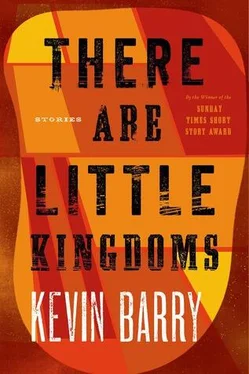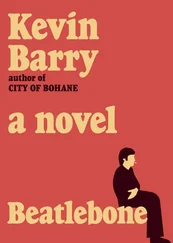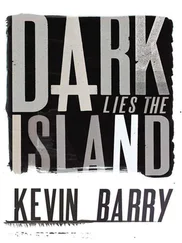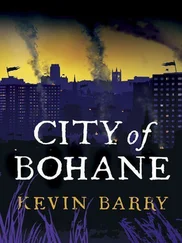Her face seemed to slip, her features came loose, disintegrated, and then rearranged. She was slippery. She was skinny, tall, sharp angled and grey skinned, with ash-coloured eyes and green-mottled hands, and now it was a pretty, blowy day, with screensaver skies. They made it to the flats and paddocks of the Curragh, a watery expanse it seemed, a lightly-ruffled sea.
Horses, she said. Sweet Jesus don’t be talking to me about horses. The worst thing that can happen with horses happened me. The first time I set foot on a racecourse, I went through the card. Limerick meeting — there were seven races, I picked seven winners. The whole cruel world of work and bosses and punching clocks at seven in the morning was revealed to me as a sham, Sarah, a world for fools. Who needed it? All you had to do was have a go at the horses.
She wiped muffin crumbs from her chin. She lifted her rueful heavy eyes to the heavens. She smiled.
Of course I wasn’t the first eejit to come up with this idea. It took no more than six months and I was wiped out. I found myself in desperate waters. The bank pulled the shutters when it saw me coming. My name was doing the rounds in faxes, twice underlined. I was blacklisted by every credit union in South Tipp, North Waterford, East Cork. But there’s always someone you can turn to and they showed up, soon enough. Two brothers, from Thurles, serious operators, hair and eyebrows, big shoulders. These boys were beef to the heels. If I’d sense, I’d have run a mile but do I look as if I have sense? I missed a payment and they showed up for a polite word. I missed a second payment and I was backed into the corner of a lounge bar. Oh, a monster! Did you realise, Sarah, that monsters are all around us? You’ve come to the right woman. I missed a third payment and that was it, I had to clear out of Tipp altogether. If I didn’t get out, it was looking like a boot-of-the-car job. I drove off late. Night-time, cold, and there were dogs somewhere, howling. I rang the boys from a payphone, I couldn’t resist. I said d’ye call yereselves men? To threaten a poor single woman? Spittin’ feathers down the phone he was. I’d have to be careful to this day about setting foot in Thurles. But that’s no great loss to me. Of course the nerves weren’t right for a long while. I was edgy, Sarah. I was drinking against nerves. It wasn’t long after I lost most of the teeth. I missed a step on an embankment. Would you believe it if I told you these are nearly all screw-ins? They’re some job, aren’t they? Thank you. Of course I paid for them in tears. I was six months on soup and custard. And if the horses were bad, you should have seen me the year of the poker machines. I still get a shake in my right hand when I hear one.
They were by the last stretch of countryside, above the surging drag of the motorway, and the exurbs crept out west, and a squat grey building sat high on a windy rise, and she pointed, and winked.
Do you see this place? she said. Do you know what that used to be? Chained to the walls, Sarah. Which end is the sleeves? Are we coming or going? Here’s one you’ll not have heard, I guarantee it. Nachtmusik! Have you ever hear that word? It’s a good one, isn’t it? Out of the Germans, and faith they’d know all about it. Going loco down in Acupulco. The soft room. The slow-shoed shuffle in the corridor. The hair stood up on your head from shocks. If the walls could talk in the likes of that place! El Casa des Locos is what a Spaniard would say. They’ve apartments made of it now. Best of luck to them all inside.
She simmered with happiness. There was great calm about her. There was no reserve about her. There was none of the wistfulness proper to old age. It was clammy on the train, and she opened her coat and loosened the collar of her blouse, and there was a cheap chain and cross on her neck — it flashed with trinket menace. For a while, she was silent, and the silence was unbearable. Her gaze went to the carriage roof, all to be seen were the whites of her eyes. She hummed to herself, crossed over, then returned.
What about yourself? she said. I wouldn’t go so far as to call you the chatty type. What’s your own situation? Do you want me to take a run at it?
She rubbed her hands: lascivious. She made as though to sketch in the air. She took on a high-toned expression. She drew broad strokes with bony fingers. She cupped her chin in her palms.
Let’s see what we’ve got, she said. The eyes are outside your head, so you were up at a dirty hour yourself. You got dressed in the dark, didn’t you? Yes, with a big brazen head, very sure of yourself. The case was packed since last night, you did it on the sly. You had it hid under the stairs. You went down the stairs and got the case and you opened the front door, very quiet, and you stepped out into the street. It’s a terrace of houses, isn’t it? Familiar as your own face but unreal at that hour: parked cars, frost, moon, not a cat on the road. You pulled the door out after you. You could hardly breathe.
And the light was starting to come through then. She went down the steps by the grotto. She went down into the bowl of the town. There was yeast in the air from the brewery. Some early workers were eating eggs in the café on the corner, lost in newspapers, winter, the steam of their tea. She went inside to get cigarettes from the machine and the men looked up, and they looked at each other. There were affectations of great sadness — a pretty girl in a pencil skirt can bring that on easy enough. A dozy smile from the plump familiar waitress, but nobody asked any questions, nobody asked where are you going so early, Sarah, and what’s with the case, girl? She went down McCurtain Street and she watched herself as she went, she painted in the drama of it. She bought a ticket at Kent Station. A single: she stressed the word. She sat on a high stool and sipped coffee and a tic of anxiety surfaced, a bird-like flutter beneath the skin. The man from the kiosk was on his knees cutting a bale of newspapers with a penknife and its blade was a blue gleam.
You’d be mistaken for angelic, said the old woman. Peachy-creamy, oh lovely, look — petite! But there’s awful distance in you.
She smiled but it was sardonic, ironical.
There’s coldness, isn’t there, Sarah? You were going to get out as soon as you could and not a word to anyone about it. To hell with it — let ’em suffer!
The world around withdrew from them. The woman reached across the table and took the girl’s slate-cold hands in hers. The pulsing ovals weakened, faded, and disappeared. There was no sound except for a soft, lone breathing. There was no way to reverse from this, or to pull back.
Listen, she said. I have news for you. Brace yourself, child, ‘cause here it comes. There is no such thing as forgiveness. Everything has a consequence. Would you believe that? Years later, you’ll still have to answer the question: was the right thing done?
The girl looked away, abruptly, into the steel glimmer of the morning. She bit on her bottom lip, so prettily. It would be hopeless to try and find a flaw on her.
I wouldn’t fret about it, said the old woman. Maybe it was the right thing. He didn’t have the courage, did he? He wouldn’t say how he felt. He wouldn’t tell you how he felt, Sarah. You see you have to stand up for it. You have to declare it.
Then it was the Clondalkin yards, mostly disused, and the dust and seep of the city had fallen on them. The train stopped to take on maintenance workers. Another train was stalled alongside, it was headed in the opposite direction. Passengers from each stared wearily across to the other. Movement, and she felt as though her train had eased slowly forwards but it was the other, pulling away west. The old woman went out through the yards. She threw no shadow in the white sun. She went over the sidings and past the rusted trailers. She went in among the carriage-building sheds and vanished, left no trace. She became light, air, dust.
Читать дальше












